Imagine a browsing experience where you can just ask a question or ask for information, and then you get succinct, helpful information handed to you.
That’s exactly what AI browsers do.
AI browsers enable you to search, with the help of AI, and get summarized information right at your fingertips, without having to visit multiple websites to get what you need.
Want to learn more about AI browsers? Discover:
- What are AI browsers?
- The most popular AI browsers
- How AI browsers impact search
- Will AI browsers replace Google?
What are AI Browsers?
AI browsers are browser platforms that bake AI into the interface, allowing you to use artificial intelligence to power your search and browsing journey. AI browsers can automate tasks, summarize content, and guide you through research without having to turn to an external platform — you can do it all in your browser window.
What are some of the most popular AI browsers?
So, what AI browsers are out there? Here are some of the big name AI browsers on the market.
Atlas
Creator: OpenAI
ChatGPT is one of the biggest generative AI platforms, so it was only a matter of time before they created an AI browser to expand the ChatGPT experience. Atlas, the AI browser from OpenAI, integrates ChatGPT functionality to enable people to leverage AI while they browse
As OpenAI puts it, “ChatGPT can come with you anywhere across the web” with this new browser. Your ChatGPT memory is built into the browser, so it can use your past chats to help you with your new tasks and searches.
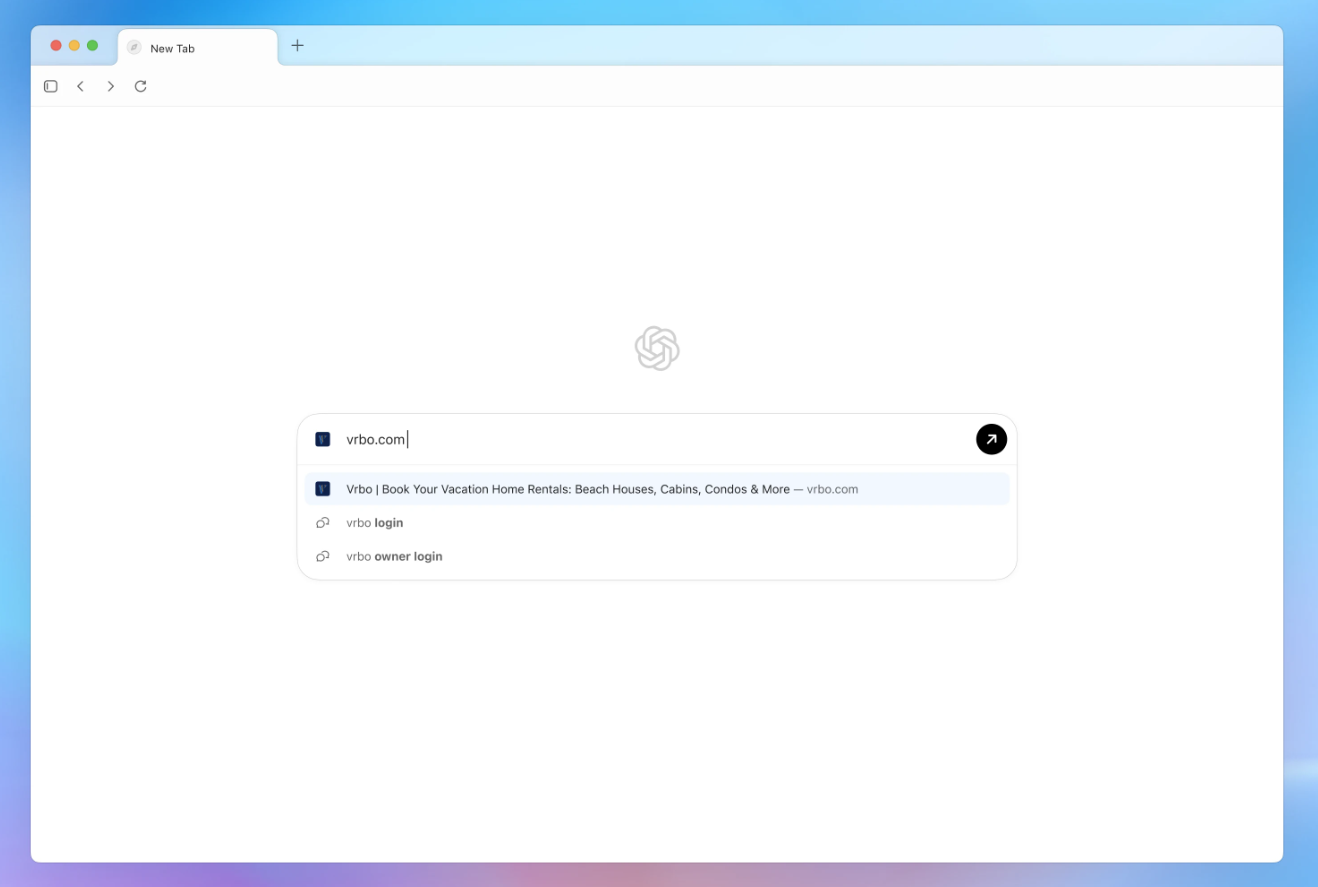
Comet
Creator: Perplexity
ChatGPT isn’t the only LLM that’s diving into the AI browser world. Perplexity created Comet, their AI-powered browser that enables you to leverage AI while you search.
Perplexity’s Comet offers an assistant sidebar, which enables you to have an AI helper that can analyze content, collect information across tabs, and more. Comet also offers a voice mode, so you can have a hands-free browsing experience.
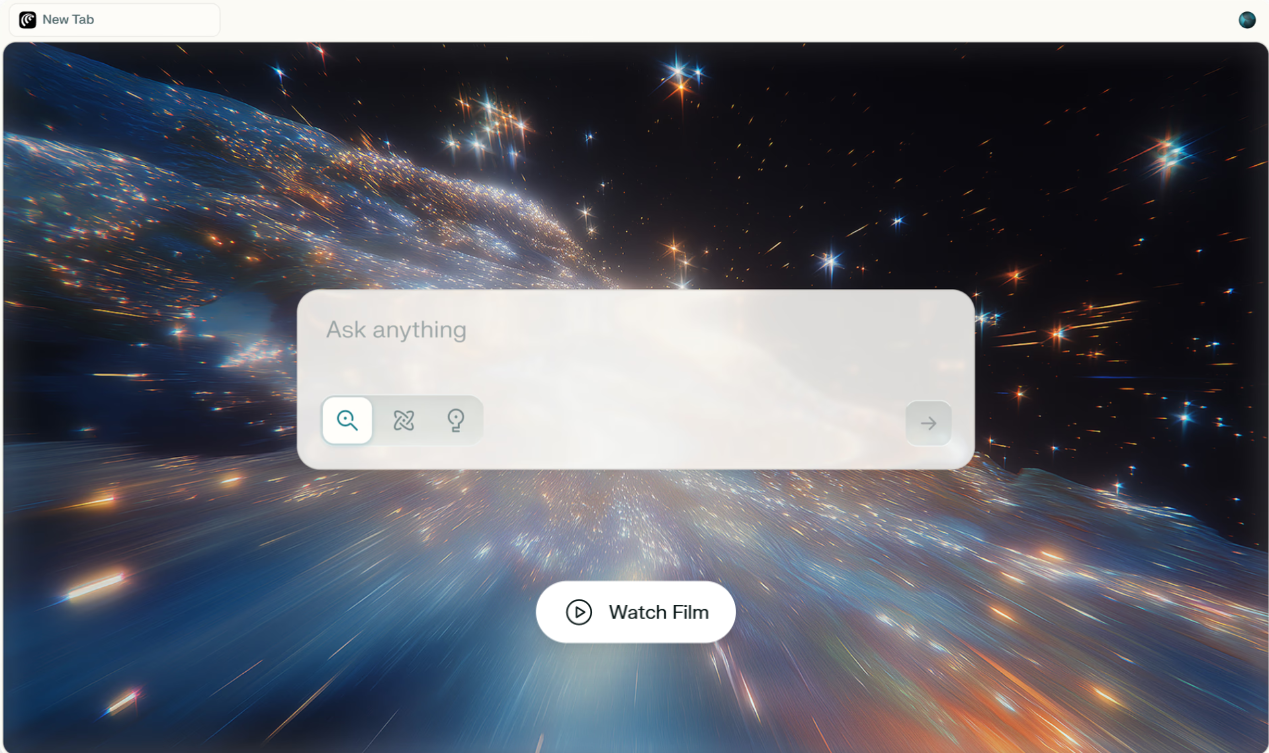
Dia (in Beta)
Creator: The Browser Company
Dia is an AI browser created by The Browser Company. They had previously created Arc, but found it was too steep of a learning curve for there to be mass adoption by users. Instead, they developed a new browser (Dia) that smoothly integrates AI into the browsing experience to make it easier for people to use.
Dia is built with an AI interface within the browser, so users can easily use AI as they browse without having to visit tools like ChatGPT or Claude.
The interface is built similar to Chrome, offering some familiarity to users. It has an AI bot built into the search bar, allowing you to use the bot to search the web, summarize files, and smoothly switch between chat and search functions.
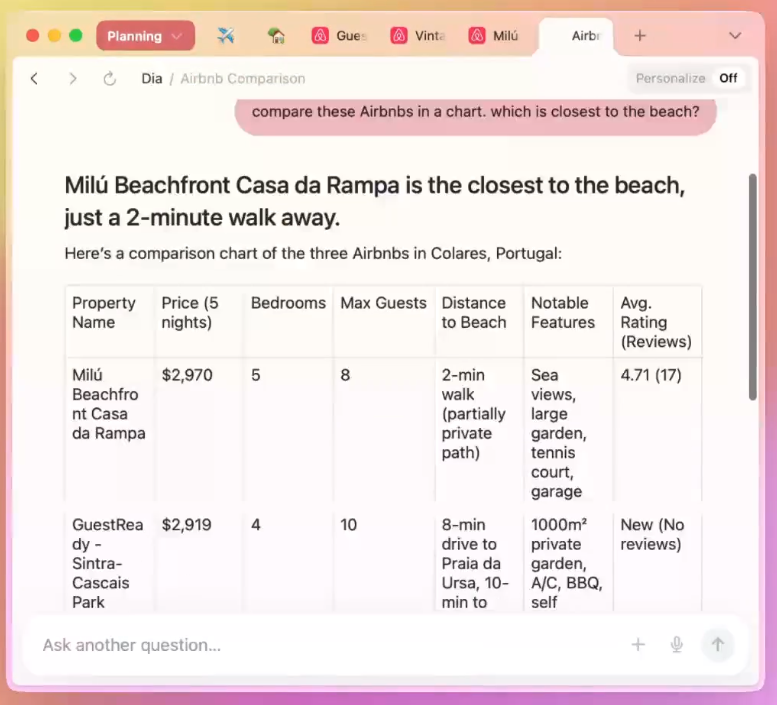
Copilot Mode
Creator: Microsoft
If you’re a frequent Microsoft Edge user, good news — you can now turn Edge into your very own AI browser. Microsoft released Copilot Mode, which enables you to turn your browser into a Copilot-powered experience.
By enabling Copilot mode, you unlock AI features like browsing with your voice, summarizing tabs, and having Copilot as your assistant to ask questions to within the browser.
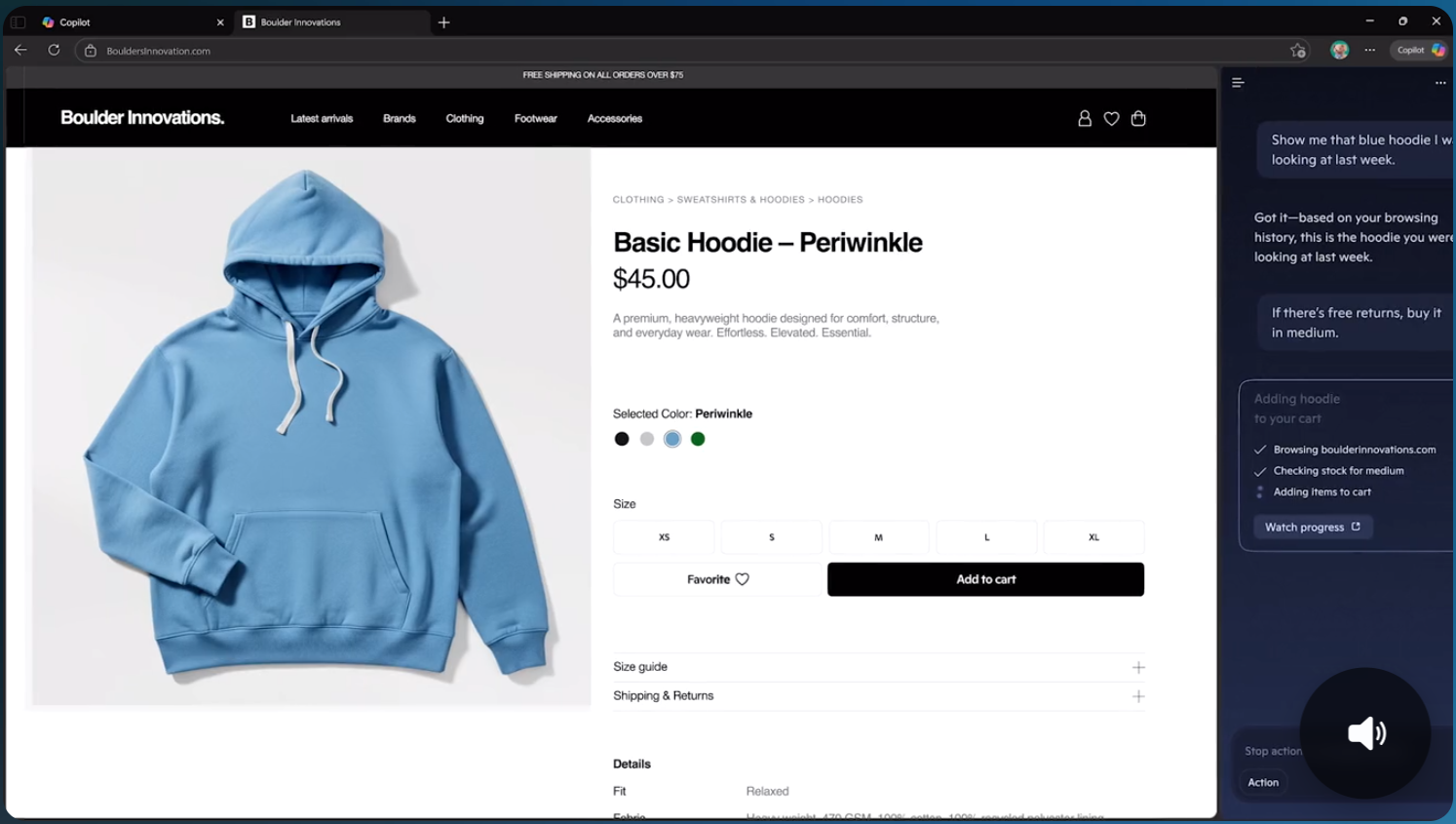
How do AI browsers impact search?
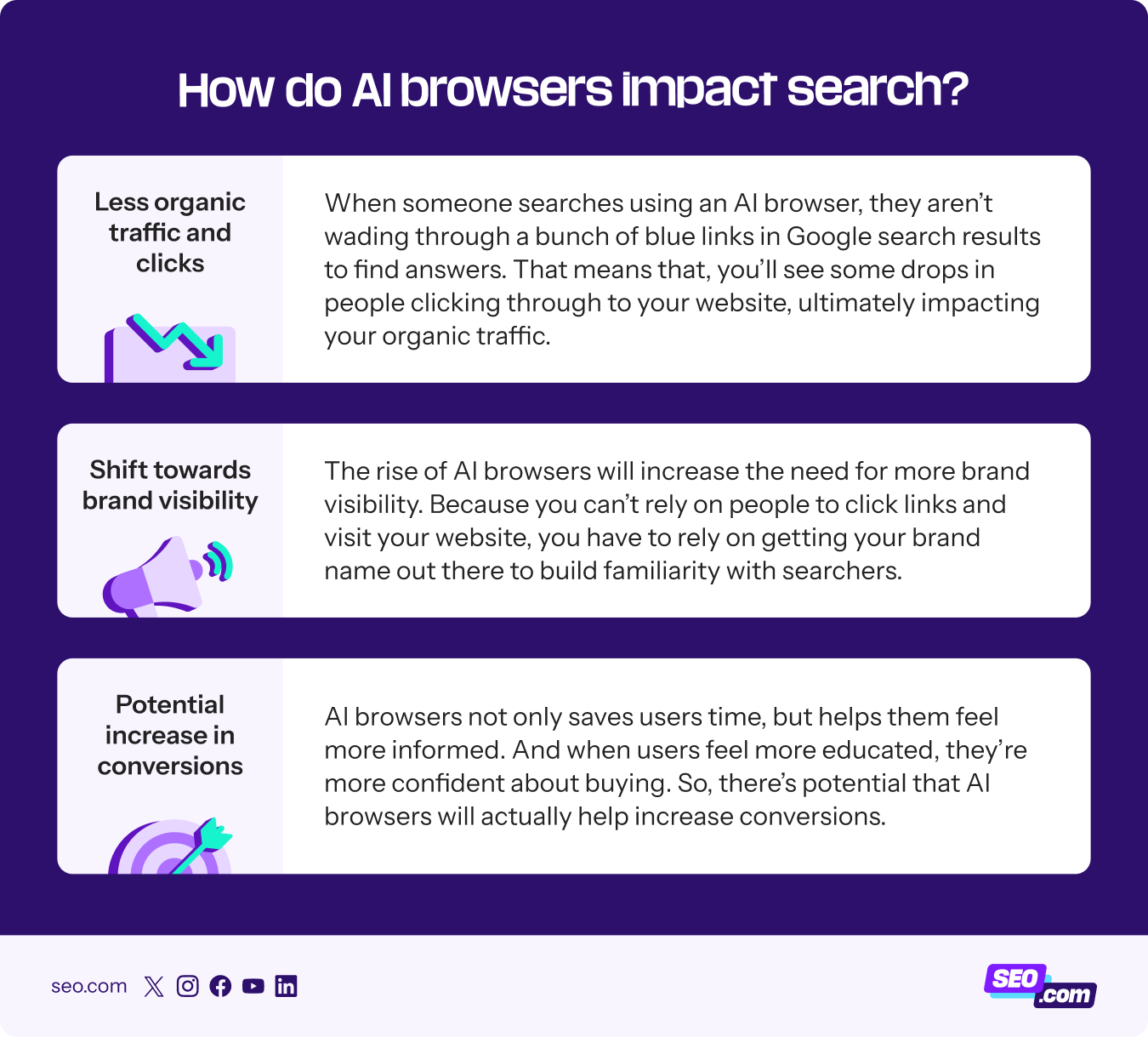
The rise of AI in search has left the lingering question: How will this impact SEO and search?
Less organic traffic and clicks
AI browsers will impact your organic traffic. Whether someone searches using Comet, Atlas, or another popular browser, they aren’t wading through a bunch of blue links in Google search results to find answers. They’re getting synchronized, summarized information that tells them what they want to know (uncited and cited).
That means that, if people regularly use these AI browsers, you’ll see some drops in people clicking through to your website, ultimately impacting your organic traffic.
Shift towards brand visibility
The rise of AI browsers will increase the need for more brand visibility. Because you can’t rely on people to click links and visit your website, you have to rely on getting your brand name out there to build familiarity with searchers.
Basically, building association between your brand and related searches will be crucial with AI browsing experiences.
Potential increase in conversions
A lot of the buzz around AI tends to be negative — it’s focused on what you’re losing. But there are some positives out of this shift, with one of them being the potential increase in conversions.
One of the most impactful things about AI search, in general, is that it helps synthesize the user’s search journey. Instead of users having to look at link after link reading through pages, they can get the information summarized for them with AI.
On top of that, AI can include additional information the user wouldn’t have considered previously.
That means that, not only does it save users time, but it helps them feel more informed. And when users feel more educated, they’re more confident about buying. So, instead of shying away from making a decision, they’re more likely to buy because they’re armed with all the information to feel confident in their decision.
So, there’s potential that AI browsers will actually help increase conversions because you’ll have more informed buyers that feel ready and prepared to purchase.
Will AI browsers replace Google?
The biggest question of them all: Is Google going to get left in the dust for these new AI browsers?
Realistically, no.
Google has a massive market share when it comes to search. It’s the most popular search engine and the default place people go to find answers. And, since Google has AI-powered features (AI Overviews, AI Mode), it’s keeping pace with the evolving search landscape.
Many people won’t use AI browsers, simply because Google is what they’re used to. If searchers are happy with the experience Google provides, they don’t really have a reason to go elsewhere. It’s already a trusted, well-known place to go to get information.
In the same vein, some people may not want to change the way they search. They may want to stick to selecting links and browsing through pages to find information, instead of AI summarizing for and guiding them. So, those people won’t have a lot of interest in making an AI browser their full-time search engine.
Some people, however, will start relying on AI browsers instead of Google to get information. Innovators and the younger generation will likely be the main adopters, which means if they’re in your target market, you may need to start thinking about how to optimize your presence in AI search.
Stay ahead of the curve with the latest AI SEO insights
Want to keep your finger on the pulse of all things AI search? Subscribe to our email newsletter for the latest information on all things AI search and SEO!

Keep Up With The Changing Landscape of SEO
Join our newsletter to receive practical tips and expert advice to help you improve your website’s visibility.



Keep Up With The Changing Landscape of SEO
Join our newsletter to receive practical tips and expert advice to help you improve your website’s visibility.

Keep Up With The Changing Landscape of SEO
Join our newsletter to receive practical tips and expert advice to help you improve your website’s visibility.
Writers


What to read next
- Jan 22, 2026
- 7 min. read


